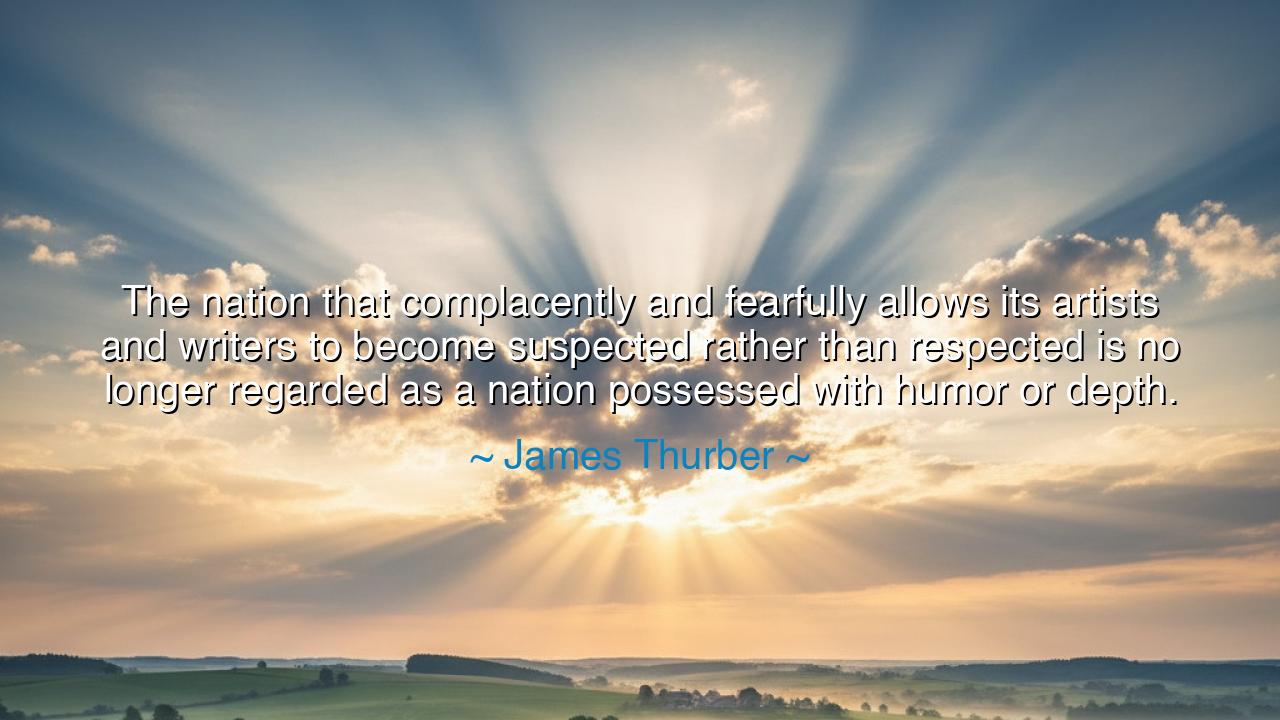
The nation that complacently and fearfully allows its artists and
The nation that complacently and fearfully allows its artists and writers to become suspected rather than respected is no longer regarded as a nation possessed with humor or depth.






"The nation that complacently and fearfully allows its artists and writers to become suspected rather than respected is no longer regarded as a nation possessed with humor or depth." These words, uttered by the insightful James Thurber, speak to a profound truth about the soul of any nation. When a society allows its artists and writers—those who speak truth, challenge norms, and stir the human spirit—to be silenced or suspected, it signals the decline of that nation's heart and soul. Thurber’s warning is not just about the role of creative individuals, but about the role of art itself in maintaining a society’s depth and its humor. To stifle the voices of those who question, provoke, and reflect the world around them is to lose touch with the very essence of what makes a culture truly alive.
In the ancient world, the philosophers and poets were the custodians of truth. They did not merely entertain or create for amusement, but their works were the means by which society’s deepest questions were explored and its truest virtues were expressed. Socrates, in his time, faced opposition not because of his lack of wisdom but because his ideas threatened the comfortable beliefs of the people. He used the power of humor and irony to challenge the status quo, questioning everything from justice to morality. In the same way, Aeschylus, the ancient Greek playwright, used drama to confront the gods, fate, and the human condition. To silence such voices would have been to silence the soul of the society itself. Art and literature are the mirrors in which we see ourselves, and when that mirror is broken, we no longer know who we are.
Consider the story of Rome, that once-mighty empire whose grandeur was not just in its military might but in its cultural and artistic achievements. The poets, historians, and dramatists of Rome shaped its identity. Cicero, the great orator, and Virgil, the poet who wrote The Aeneid, were instrumental not only in the politics of their time but in the cultivation of the spirit of Rome. Yet, as the empire began to fall into decay, it was not just the soldiers on the battlefield who lost their strength. It was also the artists and writers who had been silenced, those who once held a mirror to the truths of Roman society, that marked the true decline. The nation that allows its artists to be mistrusted is one that has forgotten how to reflect on itself with honesty, and in doing so, loses the ability to see its own future clearly.
In the modern age, we see similar struggles. Censorship, fear of the "other," and the desire to control the narrative of society often lead to the suppression of voices that challenge or question. George Orwell, in his dystopian novel 1984, warned of a society where truth was malleable, and any voice that dared to question the narrative was silenced. His portrayal of a totalitarian state, where artists and thinkers are seen as threats, is a chilling reminder of the dangers of allowing the suspected to overshadow the respected. Orwell’s humor—albeit dark—was an expression of resistance, a way of shining light on the absurdities of power and control. Like Thurber, Orwell understood that the depth of a society is only as deep as the freedom it grants its artists to explore and express the complexities of the human experience.
History teaches us that those societies that respect their artists, that allow their writers to explore the world freely, are the ones that thrive and grow in wisdom. The Renaissance, for example, was a time when artists like Leonardo da Vinci and Michelangelo were not just creators of beauty, but creators of thought. They pushed the boundaries of knowledge, inspired deep questions, and stirred the collective imagination. In their works, they revealed the vast potential of the human spirit and the importance of freedom in shaping the culture of a nation. The art they produced did not simply serve as decoration; it was a mirror of society, reflecting its hopes, its fears, and its ideals.
The lesson of James Thurber is one that we must carry forward: the true strength of a society lies not just in its wealth or its power, but in its ability to question, to laugh, and to allow its artists and writers to reflect the truth of the human condition. When we are afraid of what our artists might reveal, when we allow them to be suspected rather than celebrated, we stifle the soul of the nation. The depth of any culture is found in its willingness to listen to those who challenge it, to engage with the hard truths that art can expose. A nation that does not respect its artists is a nation that has forgotten how to grow, how to evolve, and how to look honestly at itself.
Thus, dear listener, take heed of Thurber’s words. Protect and nurture those who challenge you, who make you laugh and cry, who force you to see the world in new ways. Do not silence them in fear, for in doing so, you risk silencing the heart and depth of your own culture. Instead, honor the voices that dare to question and reflect, for it is they who will lead you into greater understanding and wisdom. Remember that the true strength of a nation lies in its willingness to listen to those who reflect its deepest truths, even when those truths are uncomfortable. The artists and writers are the torchbearers of a nation’s soul—do not let their light be extinguished.






AAdministratorAdministrator
Welcome, honored guests. Please leave a comment, we will respond soon